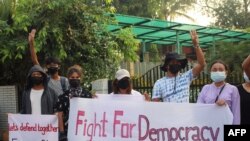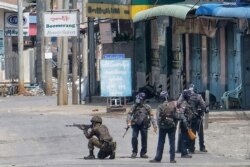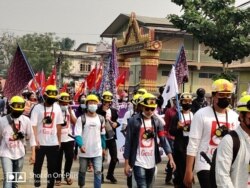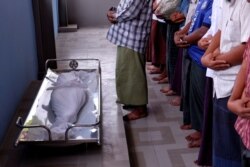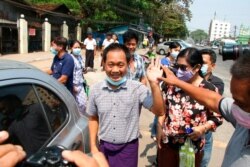One day after a “silent” strike that left the streets of many cities across Myanmar practically empty, demonstrators were out in force Thursday in a continued show of opposition against the ruling military junta.
There are scattered reports of soldiers using force to break up protests in the southeastern city of Mawlamyine and in Hpa-An, the capital of southeastern Karen state.
Soldiers also confronted protesters staging candlelight vigils across the country, with reports of at least one man being shot and killed.
Pro-democracy activists urged people to stay home and not patronize any businesses on Wednesday, a new tactic devised to avoid the military’s increasingly deadly response to the daily demonstrations, which have taken place non-stop since de facto leader Aung San Suu Kyi and other high-ranking members of the civilian government were removed from power and detained by the military on February 1.
A heavy toll
The local activist group Assistance Association for Political Prisoners (AAPP) says at least 286 people have been killed by military forces during the crackdown. One of those killed was a 7-year-old girl who was shot Tuesday when soldiers broke into her home in Mandalay, according to Myanmar Now and Reuters.
The child was reportedly sitting on her father’s lap when the soldiers broke in and demanded to know if everyone in the family was at home. The father said yes, but the soldiers accused him of lying and opened fire, hitting the girl.
The AAPP also says more than 2,900 people have been arrested and detained since the crackdown began. But more than 600 protesters were released Wednesday from Insein prison in the main city of Yangon in an apparent goodwill gesture by the junta.
Associated Press journalist Thein Zaw, who was arrested while covering a street protest in Yangon along with eight other media workers, was among those released.
Farhan Haq, a spokesman for U.N. Secretary-General António Guterres, issued a statement Wednesday urging the junta to exercise “maximum restraint” as Armed Forces Day on March 27 approaches. He called for “accountability for all the crimes and human rights violations that continue to be perpetrated in Myanmar.”
US sanctions
Citing the military’s “refusal to disavow the coup and continuing violence against peaceful protesters,” the U.S. announced further sanctions on the regime.
“Today the United States is taking its most significant action to date to impose costs on the military regime,” said Secretary of State Anthony Blinken in a statement Thursday.
The United States is designating two entities linked to the coup leaders, Myanma Economic Holdings Public Company Limited (MEHL) and Myanmar Economic Corporation Limited (MEC). MEHL and MEC are the two largest military holding companies in Burma, and all shares in them are held and managed by current or former Burmese military officers, regiments, and units, and organizations led by former service members.”
Blinken added that Britain would be taking similar actions against MEHL.
Suu Kyi is facing four criminal charges, including the possession of unlicensed walkie-talkies, violating COVID-19 restrictions, breaching telecommunication laws and incitement to cause public unrest. She has also been accused by the junta of accepting $600,000 in illegal payments.
Suu Kyi was scheduled to appear in court via videoconferencing Wednesday, but the session was postponed until April 1.
Khin Maung Zaw, a lawyer for Aung San Suu Kyi, told VOA that police blocked the thoroughfare that led to the courthouse, and only allowed two junior lawyers to enter. Khin says the judge told the two lawyers the video conferencing sessions on the docket could not take place.
Wednesday’s appearance by Suu Kyi was originally scheduled for March 15, but was called off because of a lack of internet service. Authorities have imposed nightly internet shutdowns for several weeks to prevent any sharing of protests from across the country.
Junta leaders also justified their coup by saying the Nov. 8 election won by Suu Kyi's National League for Democracy (NLD) was fraudulent — an accusation the electoral commission rejected.




